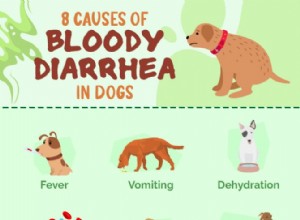급하게 화장실에 가야 하는 강아지와 밤새 깨어 있었다면 설사가 얼마나 답답한지 알 것입니다. 성견의 설사는 대부분 응급 상황이 아니지만 다음과 같은 경우에는 의료 조치가 필요합니다.
개의 설사는 심각한 것부터 비교적 경미한 것까지 다양한 요인으로 인해 발생할 수 있습니다.
위에서 언급했듯이 혈성 설사, 어린 강아지의 설사와 같은 심각한 설사의 경우 또는 상태가 24시간 이상 지속되는 경우 가능한 한 빨리 수의사의 치료를 받으십시오.
설사 치료에는 일반적으로 수분 보충, 소화 자극제가 완전히 제거되도록 음식 섭취 금지, 약물 복용이 포함됩니다.
보충: 반려동물에게 신선하고 깨끗한 물을 주어 수분을 충분히 공급했는지 확인하세요. 개가 건강하고 기민해 보인다면(설사 제외) 수박 한두 개를 먹일 수 있습니다. 달콤한 여름 과일은 92%가 수분이고 수분이 매우 풍부합니다. 씨가 내장을 막을 수 있으므로 수박에 씨가 없는지 확인하십시오.
단조로운 식단: 대부분의 수의사들은 24~48시간 동안 설사를 하는 개에게 음식을 주지 말 것을 권장하지만, 개에게 삶은 닭고기와 쌀을 일반 음식으로 주는 것도 권장합니다. 알링턴 동물 병원은 “단식 식단은 섬유질이 적기 때문에 대변 생성이 느려지고 배변 빈도가 줄어듭니다. 순한 식단은 위 시스템을 쉬게 하고 정상적인 대변 형성을 촉진하는 데 도움이 됩니다." 호박은 위장 상태를 완화하는 데 도움이 될 수 있는 또 다른 수의사 승인 식품입니다. 개에게 권장되는 호박 섭취량은 식사당 1-4 테이블스푼입니다. 강아지에게 안전하게 줄 수 있는 호박의 양을 수의사에게 확인하십시오.
제거 다이어트 :음식 알레르기 또는 과민증 검사를 받는 반려동물은 증상의 원인을 파악하기 위해 순한 제거 식단을 해야 할 수 있습니다. 이러한 식단은 매우 정확해야 합니다. 제거 식단을 제외한 다른 음식은 절대 허용되지 않습니다. 강아지가 이동해야 하는 정확한 경로에 대해 수의사에게 문의하고 앞으로 모든 종류의 새로운 단백질(캥거루, 악어 등!)을 시도할 것으로 예상하십시오.
약물 :Because diarrhea in dogs can have so many causes, the type of medication that you give will depend on the diarrhea’s underlying cause. If the stool sample that you bring to the vet’s office tests positive for parasites, your dog will need an anti-parasitic medication, often called a dewormer, every day for about 7 to 10 days. If the stool is negative for parasites, your vet will probably take a blood sample to check for elevated enzyme levels in the liver to determine the cause of tummy upset, which can be a foreign body issue, pancreatitis, or chronic condition. They might also perform diagnostic tests like abdominal x-rays, fecal cultures to look for bacteria, and biopsies of different parts of the digestive tract. Results of these diagnostic tests will determine what medications your dog will need. Give medicines like Pepto Bismol only under a vet’s supervision or with their recommendation.
For dogs who love to eat from the trash or scraps from the table, the first step is to dog-proof your home, especially the kitchen, and stop feeding human snacks to your pup. For example, use a trash can that is difficult for dogs to get into. Dogs eating people food is a common cause of diarrhea and pancreatitis, a very serious digestive disease.
Prevent your pet from eating foreign objects and other unsavory treats like animal feces, small mammals and even gravel. Keep your backyard tidy and dog-friendly by regularly scooping waste, which attracts parasites, insects and carrion birds. If you hit the dog park regularly, make sure your pet has all the proper vaccines and watch them while you’re there.
Finally, paying attention to your pet’s poop is integral to their daily health. By noticing changes that can coincide with stress or diet, you’ll know what’s normal and what isn’t. Normal dog poop is firm and chocolate-brown, while diarrhea is watery and may have specks of red, indicating blood. Knowing the difference between normal and abnormal is especially helpful when your dog may be suffering from a serious illness that you simply can’t prevent.
Taken together, diarrhea is an unpleasant but treatable condition in dogs. Pay attention to your dog’s poop and contact your vet if your dog has diarrhea for more than 24 hours.
The content is not intended to be a substitute for professional veterinarian advice, diagnosis, or treatment. Always seek the advice of your veterinarian or other qualified health provider with any questions you may have regarding a medical diagnosis, condition, or treatment options.

개가 혈변이 있는 경우 , 이것이 생명을 위협하는 상태의 증상일 수 있다는 것을 아는 것은 무서울 수 있습니다. 그러나 많은 경우 훨씬 덜 심각하며 집에서 저절로 해결됩니다. 어느 쪽이든, 개 혈변 수의사가 해결해야 합니다. 개가 피 묻은 설사를 했을 때 당신이 할 수 있는 가장 좋은 일은 기민한 것입니다. 행동과 식습관의 변화에 주의하십시오. 그의 증상을 조사하고 걱정되는 즉시 수의사의 도움을 받으십시오. 그때까지 당황하지 마십시오. 개의 혈변으로 나타나는 가장 심각한 질병 중 하나는 출혈성 위장염(HGE)으로 알려

설사는 강아지에게 아주 흔한 현상입니다. 상태는 경우에 따라 강도, 빈도 및 기간이 다릅니다. 종종 저절로 빨리 지나가지만 개의 설사가 계속되면 더 심각한 건강 상태의 징후가 될 수 있습니다. 이 게시물에서 우리는 개의 설사의 다양한 원인, 우려의 원인을 나타내는 징후 및 수의사에게 가야 할 때에 대해 논의하고 있습니다. 또한 애완동물이 가능한 한 빨리 정상 상태로 돌아올 수 있도록 강아지 설사에 대한 가정 요법을 다룰 것입니다. 목차: 개 설사란 무엇입니까? 개에게 설사를 일으키는 원인은 무엇입니까? 개의 설사 유형 개똥이